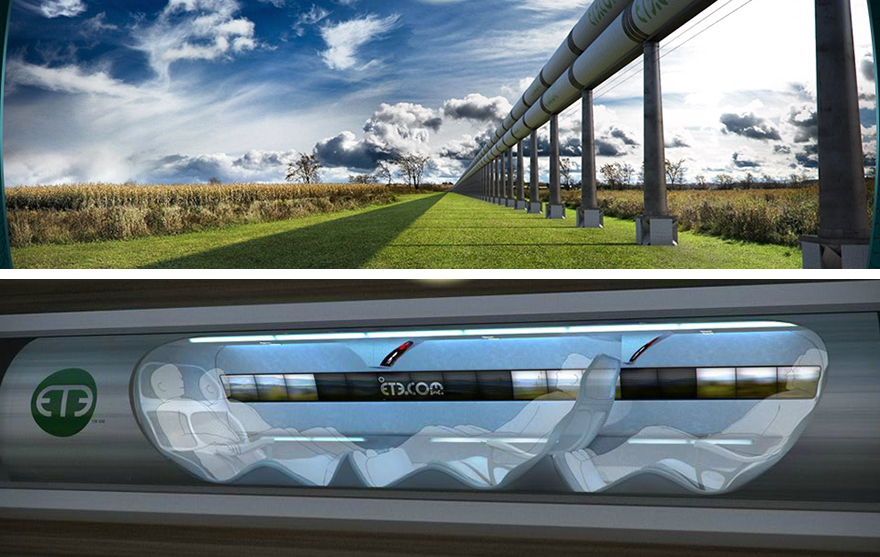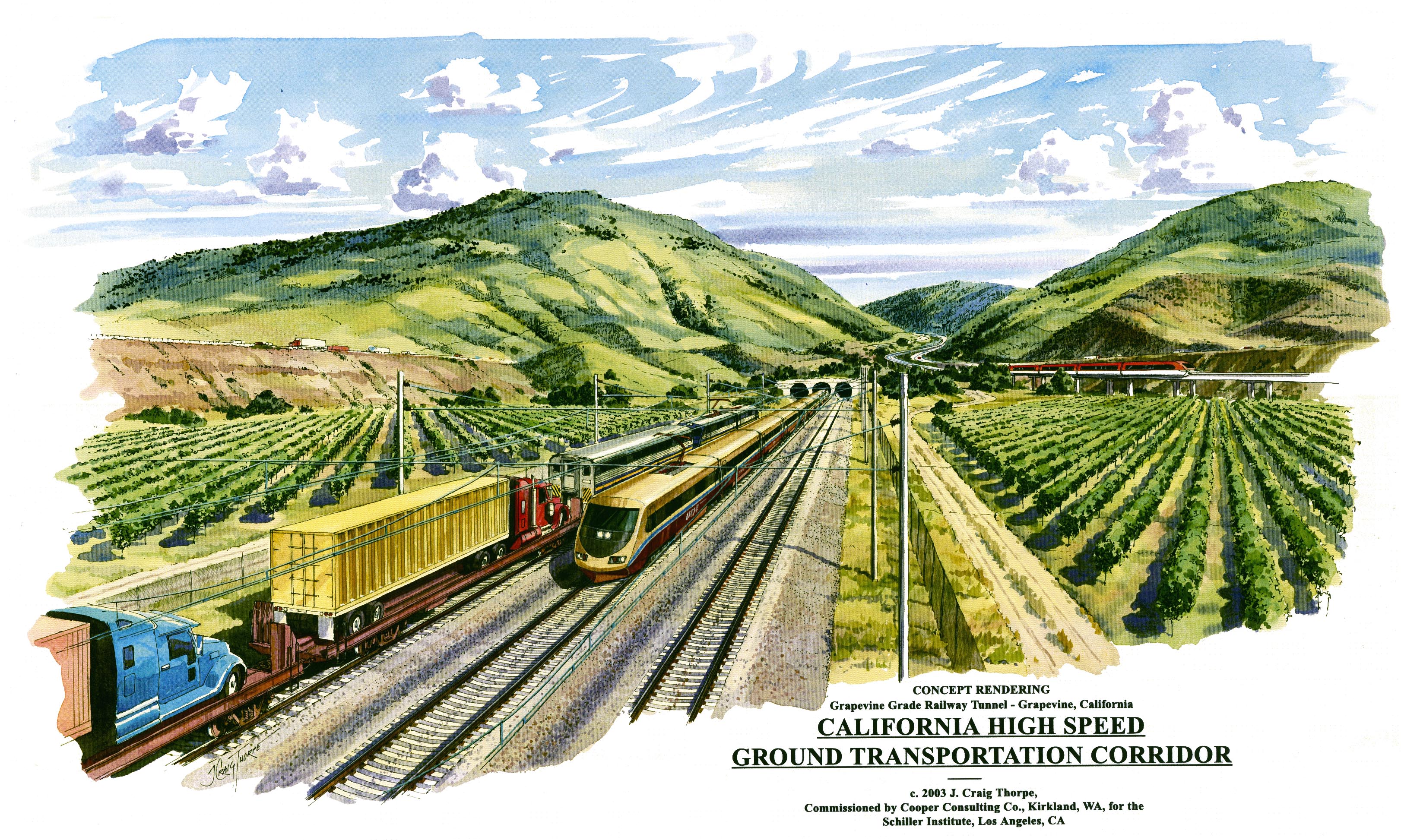
What we do know: the Hyperloop is a fantastic, gee-whiz! prospect that, in an idealized and seamless application, would get between A and B faster than we ever imagined. But whether the Hyperloop actually can (or should) be built is still very much unclear. Ever since Elon Musk (PayPal, Tesla Motors, SpaceX) first proposed the Hyperloop last year, his "white paper" plan caused a flurry of excitement and criticism for a project that was still technically quite vague but so futurist (especially as an alternative to California High-Speed Rail's lumbering difficulties) that people loved shouting about it, whether for or against.
But since then, how has the Hyperloop project developed? Focus has shifted a bit away from Musk onto Hyperloop Transportation Technologies, Inc., an engineering startup backed by JumpStartFund, a Californian crowd-funding/sourcing platform. The founders of HTT, Patricia Galloway and Marco Villa, are now organizing efforts to actually build the thing (or at least a demonstrator), gathering partner institutions to help realize the design. UCLA has joined the effort and will devote its Suprastudio masters-level architecture studio to the Hyperloop this fall, led by Craig Hodgetts (of Hodgetts + Fung), focusing on the capsule's design and overall urban planning implications.

This past Wednesday night, Hodgetts hosted a public lecture with Galloway and Villa on the Hyperloop studio's future site, UCLA's IDEAS Campus in Playa Vista. Outside, stage lights in school colors lit the entrance, and inside the space was packed, with more people standing than seated -- more of a production for an academic lecture than expected. But Hodgetts' conversation with the HTT founders had very little to do with the upcoming design studio, or even the current nitty-gritty of Hyperloop's development. Most of the discussion rehashed familiar information, or straight-up Hyperloop boosterism. Engineering details and urban-impact are still shaky, the latter motivating Hodgett's R&D legwork with his students, but certain things were left completely out of the conversation -- like the name "Elon Musk", for instance, who was instead referred to as "the visionary" for nearly the entire lecture.
Much criticism has already been written about the Hyperloop's technical qualifications, its underestimated financial needs, oversimplified political responsibilities, and its disruptive effect on urban planning measures between the nodes of Los Angeles and San Francisco. Not to mention its complete dismissal of the transportation mega-project slated for the same route, California's High-Speed Rail -- Musk's original proposal was partly inspired by disappointment in the HSR, proving that it's extremely easy to kick an unpopular project when its down. HTT did not critically engage with HSR during the lecture, but others are pushing California to replace the bullet-train measure with Hyperloop-esque technologies. But suppose every logistical detail was sorted, and the Hyperloop could become a reality -- what questions remain?
Who this project is for, the very premise for the Hyperloop's demand, is still not clear. Who would actually use it, and who stands to gain from such quick access between Los Angeles and San Francisco, are not as obvious justifiers as the fantastical sci-fi rhetoric makes them seem. The way Musk sees it, we would all be catching matinees in San Francisco and returning to Los Angeles in time for happy hour. But if access, price and speed were all they're hyped up to be, couldn't the Hyperloop become a commuter line, with folks living in Glendale and working in SoMa? Taking it to an extreme, this runs the risk of Los Angeles becoming a suburb of San Francisco (the alternate scenario seems far less likely, somehow). If kept under Musk's vision of the casual indulgence of a leisure-class, then the Hyperloop could become the new millennium's first vestige of tech-billionaire clout.

Regardless of the pros and cons, the Hyperloop is a significant proposal because of how it weighs Californian transit priorities, even if it never gets past the napkin phase. In its current state, the concept seems to cater towards those in the same class as its "visionary", and priorities are indelibly scented by Elon's own musk (sorry). It expresses: a dissatisfaction with the current state of transportation, the desire to predict the next form of mass-transit under climate change's imminent pressure, and pressure to connect increasingly expanding cities. Regardless of whether the Hyperloop is ever built, it is a fantastic encapsulation of 21st century California -- its hopes, dreams, anxieties and shames.
3 Comments
It's nice to see forward progress on transportation technologies that are actually relevant and beneficial to the future of humanity. Although I would much prefer Hyperloop to the obsolete technology of HSR. I still have issues with the whole "train concept". Hyperloops vision (so far) is to have a 28-person pod that goes between LA and San Francisco with no stops in between. This SEVERELY limits the demographics of who would benefit from this transpiration method. ET3 (Evacuated Tube Transport Technologies) on the other hand, is based on a car concept. 6-Person Capsules which can be independently directed to any access portal which is never more than 15 minutes away. For more on ET3:
TEDx talk here:
http://youtu.be/3IfyqGKX9B8
ET3-vs-Rail
http://et3.com/rail-vs-ett
ET3 is a more refined and efficient concept in my opinion with patents ready to be
implemented. Perhaps Dr. Galloway should join her efforts in working with ET3 see that
it is a more practical and greener project.
refer to the energy overview:
https://drive.google.com/file/d/0ByaWXWiohpx6WGJDZWRZSjdiUDQ/preview?pli=1
Not my words, but those of a visitor to my technology page on Facebook:
"Whoever wrote that article is sorely lacking in what this technology could have done for Humanity a long time ago.
Newsflash: mag-lev trains in vacuum tubes achieving speeds of 6400 -ish km/h was already possible to achieve on a global scale in 1974.
Technologically and resource -wise, back then, if we used state of the art construction methods, it would take about 10 years to connect the ENTIRE globe together (including every city, etc.) - today, if we unleashed full scale automation to construct this, it would take a couple of years tops.
What could it do for Humanity?
It would reduce travel times down to a fraction of what they are today while using a fraction of raw materials and energy, at extreme efficiency.
Existing unused rails and trains (there is a HUGE amount of those) as well as landfills can be easily used for raw materials that can be used in construction of the global mag-lev network.
Transportation of material goods and services would be sped up tremendously - no more waiting for days or weeks for something to arrive - but instead, mere hours at best (same would apply to international transfer of goods and services - apply tracking numbers, have people come to collect them at their local customs when they can through an automated service, and problem solved - that is of course an application in a monetary based system, while in RBE, customs wouldn't exist and transportation of goods and services from afar would not be done - instead, everything would be produced on demand locally and you can just go pick it up at the distribution center once its done or have it home delivered).
In terms of monetary based economy, this would lower costs in the long run, as well as be 100x more energy efficient than existing rail technology (even speed trains), and it would easily eliminate maintenance (due to no moving parts) or severely reduce it down to a bare fraction of what is necessary with outdated rail technology.
ETT3 and Hyperloop are our future - until we perfect transporters that is so we can transport people from one point to the other (its already being done on a miniscule scale with nothing close resembling organic matter, but exponential development in technology will make it a reality VERY soon)."
I agree...the only thing holding us back is our outdated political system and monetary economy...
Block this user
Are you sure you want to block this user and hide all related comments throughout the site?
Archinect
This is your first comment on Archinect. Your comment will be visible once approved.